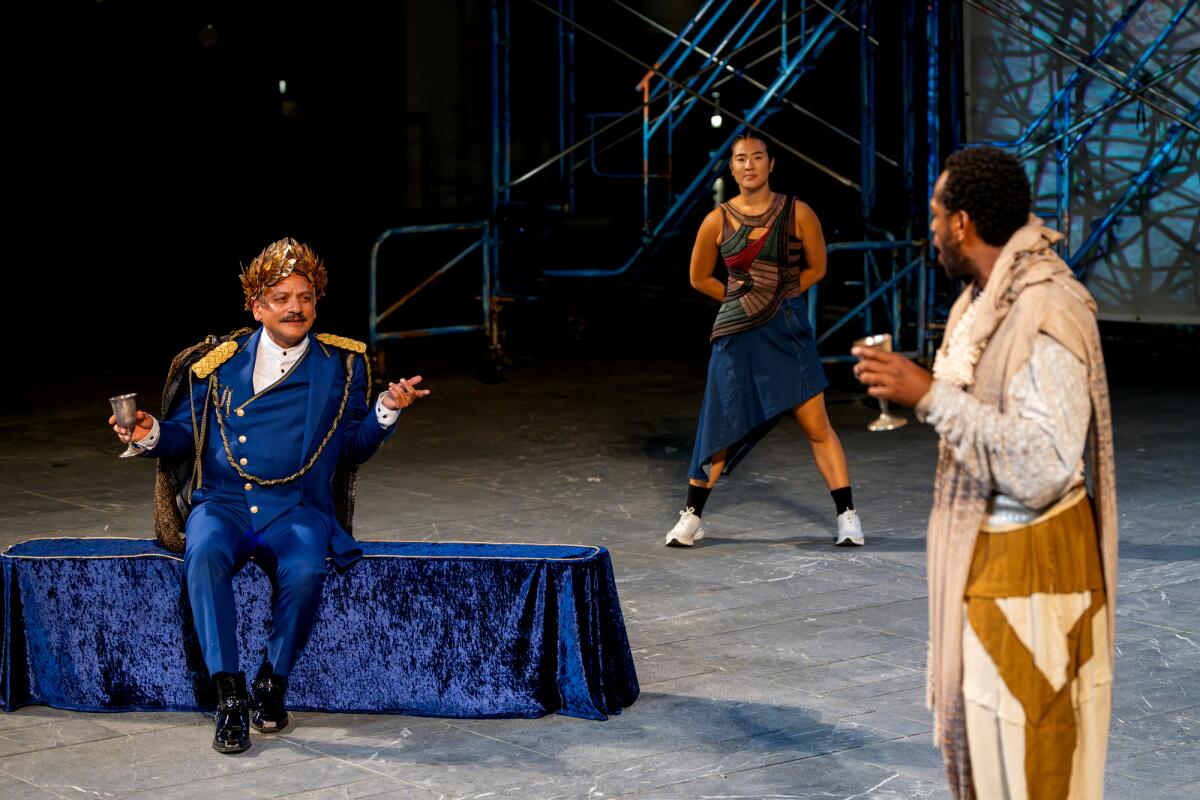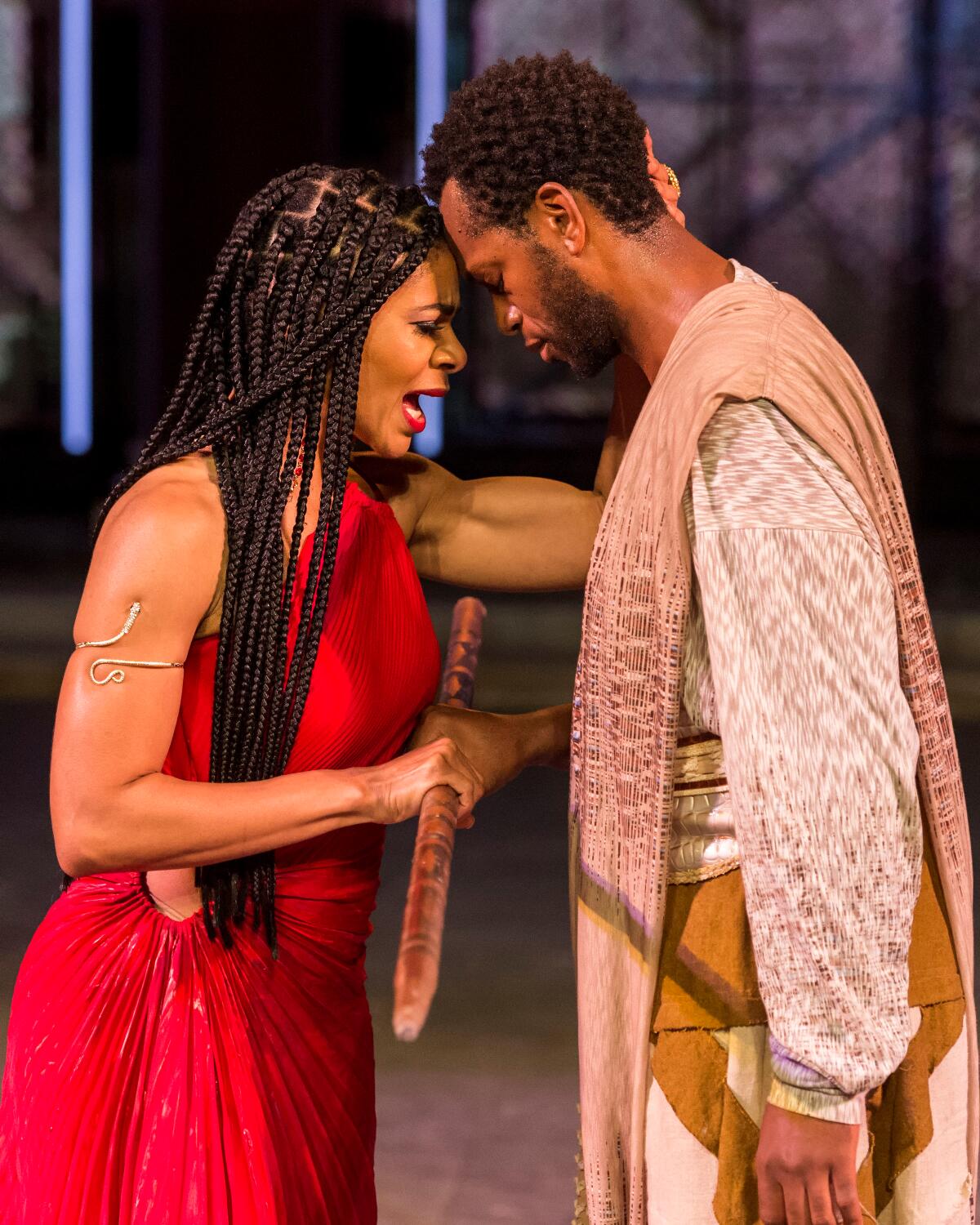‘Memnon’ restores a forgotten African hero to the Classical pantheon at the Getty Villa

- Share via
For its 18th annual outdoor theater production, the Getty Villa has reached beyond the surviving canon of ancient Greek and Roman plays. Taking center stage is a forgotten figure from the classical world, Memnon, the mythological king of the Ethiopians, who came to the aid of the Trojans at a point in the Trojan War when the Greeks were on the brink of destroying Troy.
A new play by Will Power (“Fetch Clay, Make Man”), “Memnon” tells the tale of the revered African warrior, who was a popular subject of the ancients but whose story was mislaid over the millenniums. Memnon is briefly mentioned in Homer’s “The Odyssey” and his image figures prominently on vase paintings. His death was recounted in the “Aethiopis,” the lost epic that offered a complete telling of the Trojan War in verse. But it was Homer’s version that would outlast all other sources for stories on that epic conflict.
This world-premiere production of “Memnon,” a collaboration between the Getty Villa and the Classical Theatre of Harlem, represents an act of cultural recovery. Director Carl Cofield conceived the idea of the play with Power, and the resulting work reminds us that the classical world was more culturally and racially diverse than is often credited.
The tone of “Memnon,” written in iambic hexameter, is direct, spare and cast in a tense of tragic inevitability. Thematically, Power occasionally tips his hand that the play is the product of a 21st century imagination. Identity politics sometimes strikes an all-too-explicit note. But the proud, regal, calmly commanding voice of Eric Berryman’s Memnon puts the audience under a spell.
In terms of plotting, “Memnon” doesn’t manifest the structural ingenuity of a play by Sophocles, who understood that no matter to what extent fate controls the outcome of a story, it is in those moments when a protagonist is exercising free will that an audience is mostly deeply engaged. Oedipus may not have been able to outrun the oracle revealing that he would kill his father and marry his mother. But how he responds to the horror of his unwitting actions is what makes his tale so eternally meaningful.
Dramatically, “Memnon” feels as if a section of “The Iliad” were being theatrically illustrated. The context of the story eclipses Memnon’s personal investment. It’s as if he had the misfortune to stumble into somebody else’s all-too-welcoming tragedy.
The play begins where “The Iliad” leaves off, after the death of Hector. King Priam (Jesse J. Perez) is grieving the loss of his heroic son. Polydamas (Daniel José Molina), trusted Trojan adviser, recaps the disasters that have befallen Troy before urging Priam to call on his nephew, Memnon, the renowned fighter, for military assistance. Priam is averse to this plan, but Helen (a self-possessed Andrea Patterson), whom many are blaming for the disastrous decade-long war, makes clear that it’s either Memnon or humiliation and death.
Memnon makes a rock-star entrance, strutting onto the stage like the long-awaited headliner of an all-star bill. But by the time he arrives, he seems like a figure in a story much larger than his own. That’s understandable, but he is kept at a distance. The outline of his destiny is clear and his moral qualities are exemplary. But the inner workings of his mind remain opaque.

Memnon has an impossible decision to make, whether to come to the defense of the Trojans in what looks like a futile effort or betray an ally and family member in dire need. There’s a radiant nobility to his loyalty — all the more so for the way he’s treated like an outsider, too potent to dismiss yet too exotic to fully trust. But Memnon’s deliberations seem abstract. We don’t know enough about him to agonize with him. The backstory concerning Priam’s reluctance to ask him for help only introduces more confusion.
The fundamental question of honor versus self-preservation is complicated by the inscrutable plans of the gods. Helen and Nestor (Perez, in a more animated performance than his straightforward Priam) make appeals to Zeus from opposing sides of the battle when Memnon undertakes to fight the one-man Greek war machine known as Achilles (Jesse Corbin). The issue ultimately comes down to whether Memnon will resist or succumb to fate, but that dilemma needs more character nuance to electrify us.

But the story has a freshness and Berryman’s majestic performance imbues his incomplete character with the charisma of an Othello too wise for irrational vengeance. Corbin’s beefcake Achilles may have destiny momentarily on his side, but it’s Berryman’s Memnon that leaves the most lasting heroic impression.
The staging by Cofield, associate artistic director of the Classical Theatre of Harlem, turns Troy into a modern urban combat zone. Scaffolding against a background of chain-link fences brings that battle closer to home (courtesy of Riw Rakkulchon’s scenic design and Yee Eun Nam’s projections). Celeste Jennings’ costumes make a boldly contemporary impression while retaining an archaic fierceness.
The expanse of the Getty Villa Outdoor Theatre may be underutilized. The muscular choreography by Tiffany Rea-Fisher (performed by chorus members Holly Hwang Belshaw, Kat Files and Jenna Kulacz) seems a touch too constricted for such a large playing area.
But the focus is perhaps where it should be — on Power’s poetic words. “Memnon” deserves praise not only for resurrecting a too little-known mythological figure but also for being as at home in the ancient world as in our own.
‘Memnon’
Where: Getty Villa Outdoor Theater, 17985 Pacific Coast Highway, Pacific Palisades
When: 8 p.m. Thursdays-Saturdays. Ends Sept. 28
Tickets: $45-$55
Contact: (310) 440-7300 or getty.edu
Running time: 1 hour, 20 minutes
More to Read
The biggest entertainment stories
Get our big stories about Hollywood, film, television, music, arts, culture and more right in your inbox as soon as they publish.
You may occasionally receive promotional content from the Los Angeles Times.











